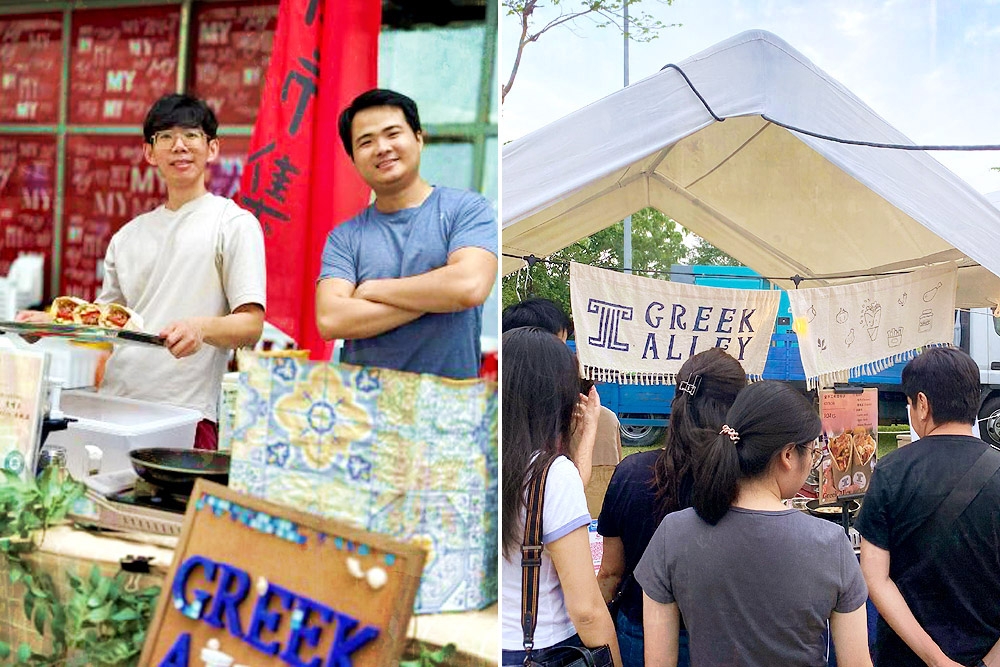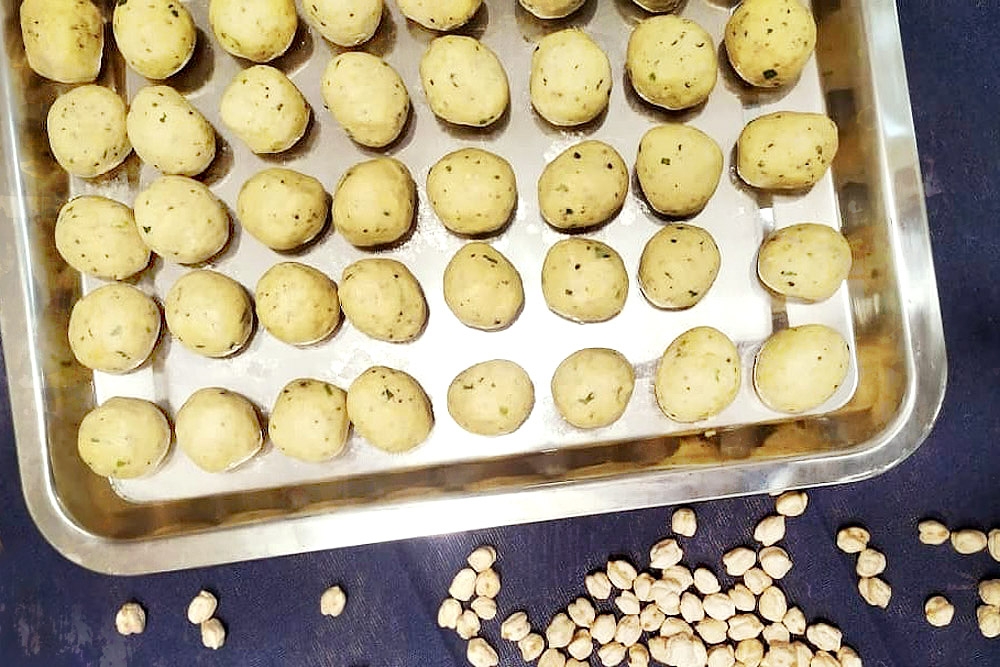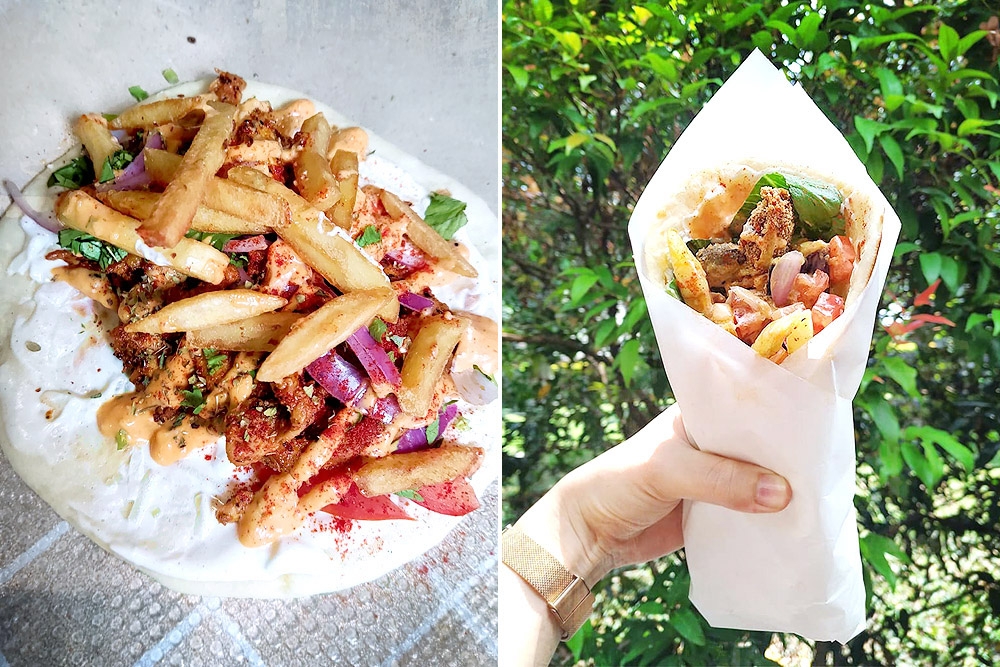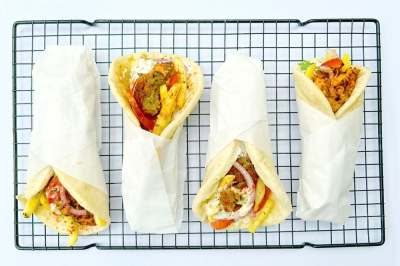KUALA LUMPUR, Feb 20 — Chunks of juicy roasted chicken. Crunchy balls of just-fried falafel. Fresh rings of raw onion, cold slices of tomato. A chilled, creamy yoghurt sauce laced with cucumber and garlic. Fries, a surprising inclusion. And a soft, pale piece of pita bread to wrap everything like a loving blanket.

This is a gyros by Greek Alley, which is — despite its name — a proudly homegrown Malaysian enterprise.
Greek Alley is founded by Richard Tan, 31, who has had eight years of F&B experience, and Jason Ng, 34, a former auditor and barista.
How did Greek Alley get started? Tan recalls, “It was back in 2018 when Jason and I were working at the same café, Three Little Birds. We dreamed about owning a café or restaurant in the future.”
Advertisement

Co-founders Jason Ng and Richard Tan (left). Greek Alley’s pop up at a weekend bazaar (right).
Eventually the duo struck upon the idea of making Greek fusion food, specifically street fare such as their own version of gyros.
Tan says, “It was back in 2016 where I went for a trip in Greece. In every block in every town, there will be a shop where they sell gyros as their daily grab-and-go fast food. Since Malaysians only know about kebabs and there aren’t a lot of Greek places that sell gyros, we thought why not this opportunity?”
Advertisement
It can be quite a jump from making flat whites to wrapping falafel in pita bread. To that end, both Tan and Ng invested all their free time in R&D (research and development) before finalising their recipe.
Tan says, “We are now proud to say that most of our items are handmade from scratch. We make our own pita bread, falafel, sauces and tzatziki. We also marinate our own chicken meat.”
One point of confusion for many customers is what differentiates Greek (or Greek fusion fare) from other cuisines. How is gyros different from a kebab, for instance?

The falafel is made from scratch using ground chickpea flour.
Tan shares, “Gyros and kebab are actually the same family tree. The only differences are the culture, ingredients, and the way they are prepared. Gyros has more flavours and textures due to the use of key ingredients such as pita bread and tzatziki.”
Tzatziki, he explains, is a mixture of Greek yoghurt, cucumbers, garlic and some fresh herbs.
“Without these two, it can’t be a gyros. And not forgetting the fries that add to the crunch!”
Since December 2022, Greek Alley has been carefully testing the market response by hosting pop-ups at various weekend bazaars and events. Currently the outfit operates from a central kitchen based in Bandar Sri Damansara, focusing on online delivery services.
Tan says, “This year, we are looking to open a physical store — maybe a kiosk or food truck — and also focusing on B2B, supplying our products to cafés and restaurants.”

Freshly fried falafel.
Greek Alley has started to experiment with new ingredients. Recently they made gyros with organic tempeh and nánr? (red fermented bean curd) mayonnaise.
Tan shares, “It was a fun little project we had with our fellow bazaar vendor, Farm Foodies — we used their products. Surprisingly the feedback was pretty good, we have got customers coming back asking for it!”
For their staple menu, Tan always recommends their falafel gyros to customers. He says, “There are not many places that sell falafel in Malaysia, or a decent one. Most that have tried our falafel gyros love it — we had a few customers who told us it was comparable to the one they had in Europe.”
However, no business grows by praise alone. The challenges that Greek Alley has faced along the way helped inform how they adapt their business strategies.
Tan explains, “How should we market our products to our fellow Malaysians? Because our main competitors are clearly kebabs or shawarma. But most customers have never heard of gyros and still see our gyros as kebabs.”

Each gyros comes wrapped in pita bread, with a source of protein, tzatziki, mixed vegetables and fries.

Tzatziki (left). Falafel and fries (right).
Getting a foothold in what can be viewed as a very saturated industry remains an uphill climb, Tan admits. He adds, “It’s a very niche market… I believe if we keep promoting our uniqueness, more and more people will be willing to try out our Greek Fusion cuisine.”
Moving forward, Greek Alley is digging further into R&D to develop new products. Tan says, “By opening a physical outlet, it will be easier for customers to find us. We are also planning to collaborate with other eateries, by supplying our frozen products to them.”
Ultimately a successful food business can survive on novelty alone. Every passing month brings a new food fad, or so it seems.
What might help Greek Alley’s offerings stay the course could be its appeal to the demanding Malaysian palate. Tan says, “We would say our products suit the taste buds of both Greeks and Malaysians, where we emphasise a lot on the flavours, texture, sauces, etc.”
Who knows? In the future, ordering gyros might be as natural as picking up a dozen Korean fried chicken wings or a sushi platter.
Whether making it more authentic or more fusion (more nánr? mayonnaise, anyone?) would prove a better move, only time will tell.
Greek Alley
Phone: 011-5649 0935
*Follow us on Instagram @eatdrinkmm for more food gems.







